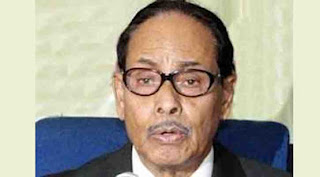The present fiscal's defence allocation is more than those earmarked for health, social security and welfare, energy and power.
“We are committed to build a strong and modern defense force capable of
meeting the challenges of the 21st century,” Muhith said in his budget
speech.
The allocation is 6.51 percent of the proposed Tk 2.22 trillion budget.
The health sector will receive 4.27 percent in the proposed budget while energy and power 5.10 percent and social security and welfare 5.68 percent.
The minister said they had taken steps to modernise the armed forces and enhance operational capacity of units and headquarters.
“We have formed a Naval Commando Unit and started procuring key hardware to modernise our navy,” Muhith said.
In order to strengthen and enhance operational capacity of the Air Force, he said, a new air base has been established and new combat aircrafts and helicopters are being added to the fleet.
Bangladesh tops the list of countries sending troops to the UN peace keeping mission.
The minister said currently 6,987 Bangladeshi peace keepers were engaged in UN peace keeping missions.
In the first three years of the current government, he said, Bangladeshi peace keepers earned foreign exchange equivalent to Tk 53.54 billion.
The earning is Tk 5.61 billion in this year.
The allocation is 6.51 percent of the proposed Tk 2.22 trillion budget.
The health sector will receive 4.27 percent in the proposed budget while energy and power 5.10 percent and social security and welfare 5.68 percent.
The minister said they had taken steps to modernise the armed forces and enhance operational capacity of units and headquarters.
“We have formed a Naval Commando Unit and started procuring key hardware to modernise our navy,” Muhith said.
In order to strengthen and enhance operational capacity of the Air Force, he said, a new air base has been established and new combat aircrafts and helicopters are being added to the fleet.
Bangladesh tops the list of countries sending troops to the UN peace keeping mission.
The minister said currently 6,987 Bangladeshi peace keepers were engaged in UN peace keeping missions.
In the first three years of the current government, he said, Bangladeshi peace keepers earned foreign exchange equivalent to Tk 53.54 billion.
The earning is Tk 5.61 billion in this year.











